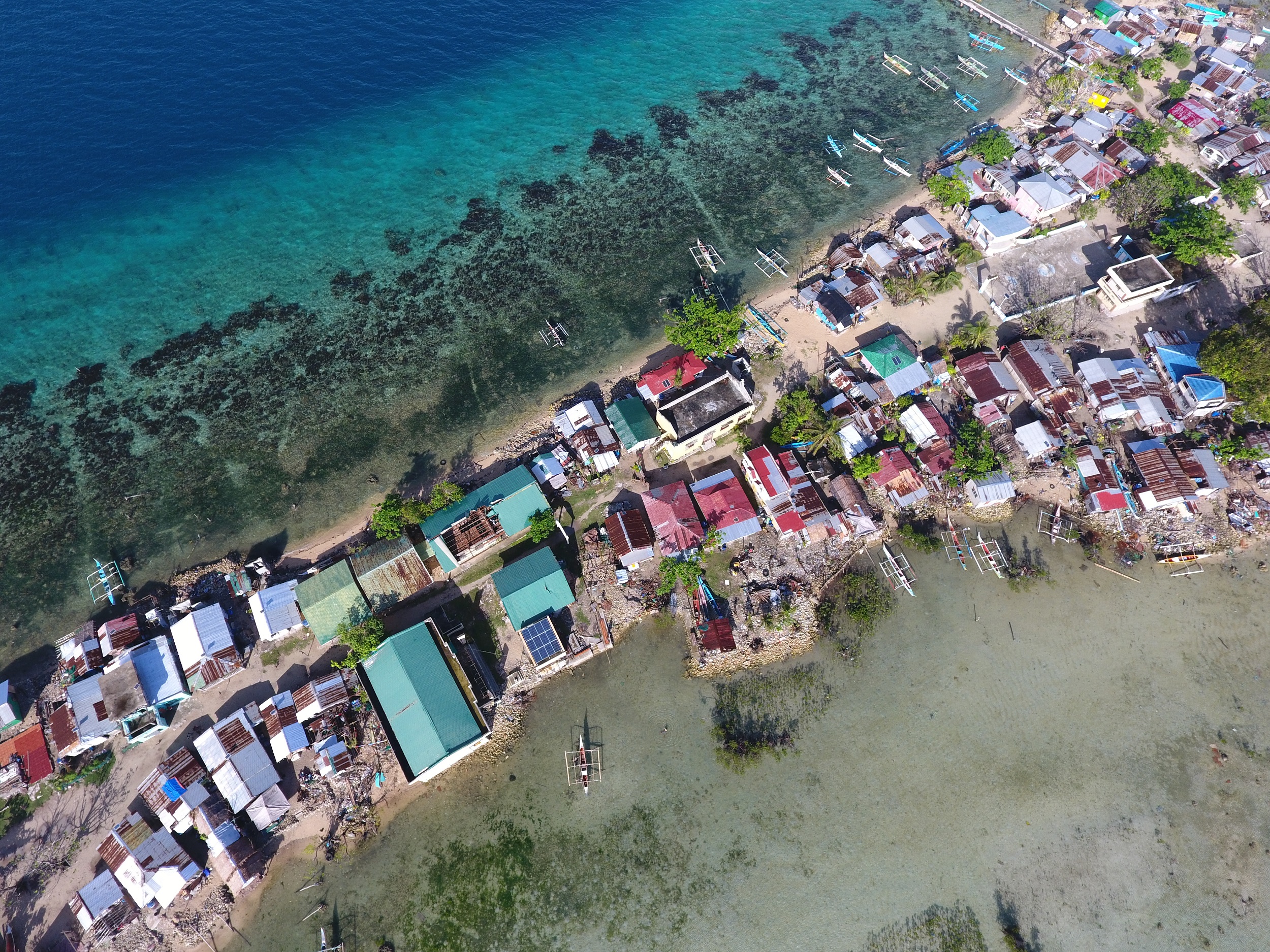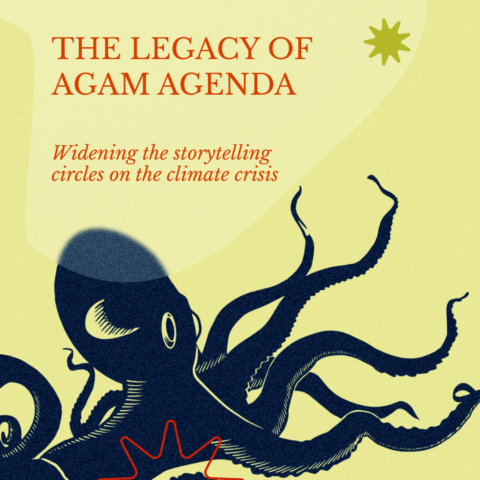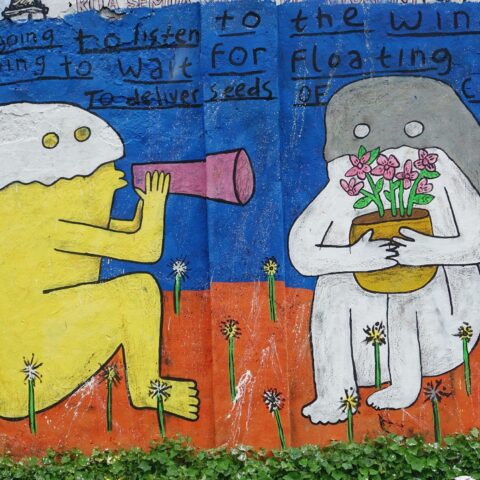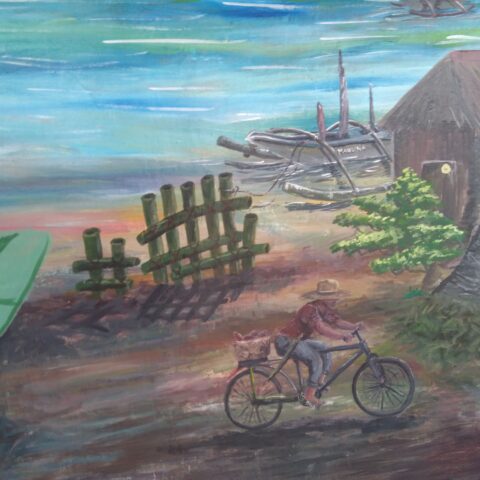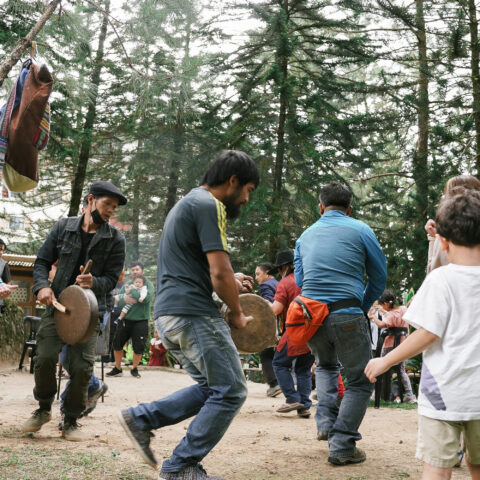Photo credit: AC Dimatatac
By Renato Redentor Constantino
Read out loud at the panel discussion Humanizing Climate, hosted by the Museum of Contemporary Art and Design, together with PAGASA, Institute for Climate and Sustainable Cities, OML Center, and Manila Observatory.
Thank you for inviting me to this important event. I head an international organization working with and advising 48 governments of some of the most vulnerable countries in the world. We’re deeply involved in developing technical energy, transport, resilience policies, but today we approach the discussion from a different but just as necessary angle. It is my pleasure to provide you with one of today’s provocations.
There have been countless initiatives over the last few years attempting to make sense of the climate crisis and its implications. Few have bothered to ask why, despite the fact that climate change poses real, monumental, existential implications to our economy, too few have taken up the challenge in ways that go beyond over-specialized approaches.
It’s fortunate that the country seems to have moved past its previous fixation, which considered climate change an environmental issue.
Regrettably, we have merely replaced one fixation with another. Today, chances are, when you raise the issue of climate change, policymakers, activists, advocates, business leaders and media will likely equate the crisis with disasters, which is an important but also mere subset of a far larger challenge threatening the very viability of the Philippines as a nation now and over the long haul. Because slow onset climate effects such as rising sea levels, ocean acidification, and changes in hydrology are not disasters per se, and the impacts are already taking place without the drama of calamity, yet they pose life-threatening long-term impacts as well.
The way climate issues are digested by a large part of the public which monitors the news is quite shallow, and this is not surprising because of the way climate is communicated as well. The size of this threat should be obvious, and yet advocates seem to be persistent in their efforts to make it smaller, in order to fit their campaigns.
The climate crisis is also raised in ways that are divorced from elements that can make climate change recognizable to Filipinos.
If it is not a mere environmental problem, and if it wrong to frame and equate climate with disasters, what is it? Simply put, climate change is a development crisis. It means we have an opportunity, especially in our current pandemic-defined context, to re-establish the narrative in ways that focus on a few things that are virtually absent from the dominant public discourse, whether debates are taking place in government, among civil society, or among artists, the private sector, or the academe.

We need to talk more about history and memory.
And we need to confront our entirely fixable gross failure to programmatically, doggedly integrate science with the humanities, and humanities with science.
Our first problem deals with our severely limited notion of time, which means the horizon we see looking forward or behind us is extremely abbreviated. This has fundamental implications to our ability to establish a different, kinder, future. Our inability to see much of the past is a reflection of how limited—how injured—our capacity is to reimagine the future.
Imagine a football field, which represents, loosely, geological time, or our planet’s past. Where does the chapter of humanity begin in this history? The last blade of grass at the other end. That is our place in the world. And yet, and yet, pause and think about it. Humanity’s chapter in geologic history is so tiny, so infinitesimal, and yet here we are already altering the conditions in which countless other species have survived and thrived over millennia, creating conditions for potential ecosystem collapse, including our ridiculously small presence. We seem to be in a mad almost gleeful rush to delete our ability to survive and thrive with the rest of the living planet.
We are unable to benefit from the clues scattered all around us, because we have valued history so poorly. As a result, our sense of agency is damaged as well.
“Our fascination with the possibility of life on other worlds is entirely understandable,” wrote the myrmecologist Edward Osborne Wilson once. “Yet it is passing strange that we pay so little attention to the largely unknown world all around us. The strange yet lovely biosphere is our only harbor in the vastness of space.”
What prevents us from seeing the grace that surrounds us? Is it the size of the picture that denies recognition? Or is it a sense of smallness that keeps our vision low and at ground level? How do we comprehend the enormity of the world and our tiny spot in its glory?
I think of Carl Sagan now, who also chewed on this question and who offered an insight that is just as gripping. “For small creatures such as we,” said Sagan, “the vastness is made bearable only through love.” I would add to love the ability of our species to act as part of something far more immense in order to justify our tiny blip in the universe.
Because the truth is, as the renowned scientist, Lynn Margulis, so succinctly said, “We and our primate relatives are not special, just recent.”
And yet here we are, governed by our extremely limited appreciation of time, and our sense of the future is limited to electoral cycles, or six years. As for the past, many can recall only the period of Martial Law, or EDSA.
To be blamed is rigidity and many on the Left and the perverse kind of colonial thinking that makes familiar the lives of Zhou En Lai and Mao Tse Tung, Vladimir Lenin and Leon Trotsky, Ho Chi Minh and Vo Nguyen Giap, Castro and Che Guevarra. But the birthdays and dates of deaths, much less the incredible revolutionary lives, of our own heroes go by unmarked and without celebration: Apolonia Catra, the only named woman officer in Pres. Macario Sakay’s command. Teresa Magbanua. Julian Montalan. Remedios Gomez-Paraiso, or Kumander Liwayway. Pedro Abad Santos. Jose Abad Santos. Claro Mayo Recto. No gathering to this day is organized by the Left to commemorate the birth or death of Oriang de Jesus.
And yet some wonder why too few remember Lean Alejandro, who fought to bring down the tyranny of Ferdinand Marcos but who was murdered a year after the fall of the dictatorship, supposedly under the sway of the restored democratic order. Or we wonder why still too few are aware of the life of Gloria Capitan, who fought to bring down the reign of fossil fuels in Bataan as her contribution to the fight against dangerous climate change—Gloria Capitan who was assassinated in 2016—the first recorded extra-judicial killing under the Duterte government.

We are unable to benefit from the clues scattered all around us, because we have valued history so poorly. As a result, our sense of agency is damaged as well.
In Samar, there are massive cave networks that Filipinos used to hide from Spanish colonial authorities. They are the same karst formations that sheltered revolutionaries from American imperial troops, and Japanese fascist forces, and the murderous military under the Marcos regime. Today, communities still use these caves as their last line of refuge, because they provide shelter during extreme weather events, such as Supertyphoon Haiyan in 2013.
In the town of Balangiga, one of the Church’s cemetery designs for those killed by superstorm Yolanda incorporates the remains of those killed in the Balangiga encounter, where US occupying forces suffered their greatest losses. Imagine that. This is the province where massacres took place in furtherance of the command of US General Howling Jake Smith who called for the murder of all Filipinos 10 years old and above. But there’s little use for insights stemming from this intersection, since few are even aware of the Philippine-American War. And when the bells were returned recently, there was little talk about history overlapping with the climate crisis and the role of the US as one of the strongest purveyors of the fossil economy, and a different future we can chart.
We need a robust sense of hope—not abstract blind optimism, but active hope. Hope as a practice.
We are dealing with the debris of forgetting today, which continues to create the unbearable weight of loneliness, increasingly divorced as we are from the torments of our nation just because we are unable to deal with the anguish and hopes of our past. It also means we cannot see nor propagate much less construct the kind of future our children deserve because neither can we see beyond a few years.
The truth is, all the impacts we are dealing with today, in particular events such as Ondoy and Yolanda and Rolly, are because of emissions we failed to prevent twenty or thirty years ago. This also means everything we do today will matter, perhaps not to the current generation, but certainly the children of our kids today can have a far better tomorrow compared to the future that is on offer today because of inaction.
Where exactly do we go from here? Language is certainly central to answering that question.
In his poem, “Ang Nagbabagang Langit,” the distinguished poet Romulo Baquiran, Jr. gives us an example of tremendous opportunities to re-shape the dialogue within the country. Baquiran asks a simple question but also provides in short lines what a thousand volumes of policy studies and scientific endeavors could not:
Anong nangyari sa ulan?/ Wala sa dating hulog ang patak./ Kung minsan ayaw magpaawat sa pagbuhos/ kaya ang panatag na bundok/ dambuhalang dumadausdos,/ upang maging puntod/ ng buong bayan.
Agam: Filipino Narratives on Uncertainty and Climate Change is a book we published a few years ago. It is composed of 26 images, 24 narratives in verse and prose, written in eight languages, covering Bicol, Ilocano, Waray, Cebuano, Tagalog, Maguindanao, Sinama, and English. It was written by poets, novelists, journalists, a climate scientist, a veterinarian, a porn star, and anthropologists. They were requested to contribute to a book about climate change but without using words such as climate change, mitigation, adaptation, and fake words such as “mainstreaming”—because really, if a word does not have its equivalent in the vernacular, it is NOT in the consciousness of people. This is one reason why, unlike campaigns in Thailand and China, the campaign against genetically modified organisms or GMOS never took off. Because the nearest term anyone ever developed a proper term—because very few paid attention to the centrality of language—was literal. They called GMOs kinalikot na himaymaybuhay. As my good friend, theater artist, actor and director Joel Saracho once said, “Himaymay buhay nga hindi ko na maintindihan, kinalikot mo pa.”
Baquiran poses the simple question that embeds the answer as well: “Anong nangyari sa ulan?/ Wala sa dating hulog ang patak.”
Agam won three national book awards, and with great pride, an international sequel will be launched this year, in a new book organized by Padmapani Perez, whose poem is the first in the original Agam book. The new one, thanks to the mighty brain and heart of Padma, will contain thirty contributions from some of the most distinguished poets and writers from Asia, the Pacific, Latin America and Africa. It will include the works of poets such as Gawani Gayangen, and Luisa Igloria, and the haunting, compelling magic of Marjorie Evasco.
Colleagues, in an excerpt from her poem, “Caravan of the Waterbearers,” Marjorie Evasco gives us a glimpse of both destination and journey, in ways only poets of great power can illuminate.
She writes:
We have had to seek the center of the storm in the land we claim is ours… / we see the blur of broken earth, / blasted wastes, damned seas. / Our vision clears in our weeping / We have joined the trek / of desert women, humped over from carrying our own oases in the claypots of our lives, gathering broken shards we find in memory of those who went / ahead of us, alone.
“When we seize the watersource,” writes Evasco, “our ranks will complete the circle we used to mark around / our tents, making homes, villages, temples, schools, our healing places. / And we will bear witness for our daughters and sons, telling them true stories / of the caravan.”
In her poem, “When Death Comes,” the late and deeply loved poet Mary Oliver gave humanity the ultimate recipe for meaning:
When it's over, I want to say all my life / I was a bride married to amazement. / [That] I was the bridegroom, taking the world into my arms. / When it's over, I don't want to wonder / if I have made of my life something particular, and real. / I don't want to find myself sighing and frightened, / or full of argument. / I don't want to end up simply having visited this world.
“I look upon everything,” Oliver wrote, “as a brotherhood and a sisterhood, / and I look upon time as no more than an idea, / and I consider eternity as another possibility, / and I think of each life as a flower, as common / as a field daisy, and as singular, / and each name a comfortable music in the mouth, / tending, as all music does, toward silence.”
In the face of the most serious threat our nation has ever faced, it’s about time we focused our energies on the gaps that urgently need to be filled.
It’s time we dwell on the intersections between memory, citizenship, and the elusive sense of agency we need to chase, lest we slide into unfettered despondency. We need to speak with one another first, and also to the past, and certainly to a future we need to share.
We need to confront the consequences of short-term thinking and the debilitating impact of forgetfulness. But we also need to locate as well vast springs that can trigger better remembering, utilizing unconventional pedagogy that enables curiosity in order to transform history into a more legible, reliable companion as we establish the future daily.
Why do we campaign? Why do we fight? Because to many of us, we have sense that a dangerous cliff is ahead of us, but we are unsure how ragged the edge is and if it’s one sheer drop to the bottom.
Many of us have decided they want to, they need to, they must, do something to change the course their community or country has taken. And that is good. But sometimes it is also not enough. We need memory, we need history. We need a robust sense of hope—not abstract blind optimism, but active hope. Hope as a practice. Because hope IS a practice, one we must renew daily, by acting in defiance of despair and indifference.
Some of us might be under the terrible delusion that we can change the world. I am in this boat, and I hope many of the participants are as well. Because if we did not and if we do not believe we can change the world, whether incrementally or in great big gushes, then we’ll be asking ourselves all the time and more and more often the ultimate demoralizing question: what’s the point?
It is time we use all the elements at our disposal: science, the humanities, politics, and the incredibly stubborn notion that our fleeting presence in the world somehow matters.
The process of helping deliver meaningful and monumental change is always a balance. We will never ever deliver the colossal change we want as individuals intent on living individual lives. And yet individual acts, when acting in concert with others or taking action on our own driven by the dictates of conscience, justify our tiny blip in the universe. And we need to visualize this, we need words that convey the imagery not just of the dangers we face but the hope of collective action as well. Action by people with an ever greater sense of agency.
Many are aware of the thunderclaps in history that have ushered in massive changes, but few pay attention to the small hammers that over the years and over decades have been chipping away at the rock face, patiently doing their part knowing they might not.
We are ultimately fighting to bring down the dictatorship of accumulation and consumption. We are fighting for a world where young people are able to psychologically reproduce their own worth and future without depending on the act of purchase.
It is time we use all the elements at our disposal: science, the humanities, politics, and the incredibly stubborn notion that our fleeting presence in the world somehow matters. Because everything ultimately counts. And in the end, everyone will matter.
